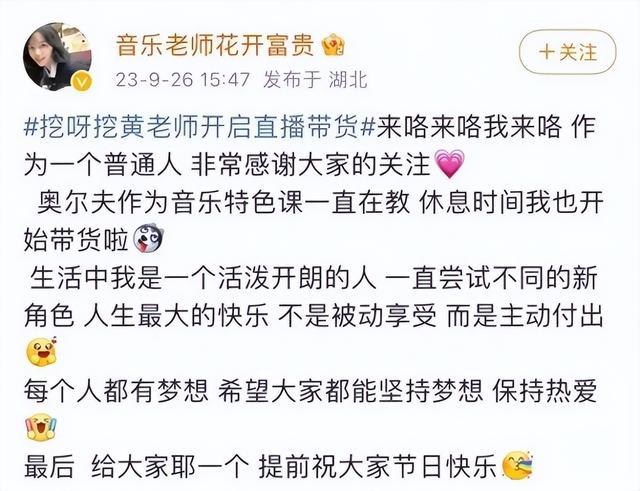95% of Live Streamers Earn Less Than 5,000 Yuan Monthly - Why Do They Make Less Than Food Delivery Workers?
-
Survey shows: 95.2% of Chinese live streamers earn less than 5,000 yuan monthly, while only 0.4% make over 100,000 yuan
Remember the viral 'Dig Dig' children's song teacher Ms. Huang?

She gained nearly 8 million followers within 5 months and sparked numerous imitations online. Recently, she has started live-streaming e-commerce.
Ms. Huang launches live-streaming e-commerce:
Music lessons continue as usual
Data shows Ms. Huang hosted 5 live streams in the past 30 days, averaging 5.823 million views per session with peak viewership reaching 8.148 million. Her live-stream sales ranged between 1-2.5 million yuan.
Her follower count grew to 5 million in May, and after starting live-streaming e-commerce in September, it increased to 8 million followers.
It is worth noting that Teacher Huang has lost nearly 50,000 followers in the past 30 days, raising questions about the sustainability of her live streaming sales performance.
Videos show that during her live streams, Teacher Huang appeared very nervous and even apologized to fans for misquoting product prices.
On September 26, Teacher Huang responded to the live streaming sales controversy on her personal Weibo, stating that she is still engaged in music education and only started live streaming during her free time. She described herself as a lively and cheerful person who enjoys exploring new roles in life.
Addressing concerns that it might be inappropriate for a teacher to engage in live streaming sales, Teacher Huang clarified that she is not a kindergarten teacher but a trainer for a specialized music course.

On October 8, she posted another Weibo message, reminiscing about how happy she was last October.
Earlier, when Teacher Huang first gained popularity, many netizens questioned whether she would quit her job to become an internet celebrity, the authenticity of her identity as a kindergarten teacher, and whether she had a professional team.
At the time, Teacher Huang publicly responded that she had not resigned, saying, "In the days to come, I want to use music to heal more people."
In her statement addressing the skepticism, Teacher Huang also mentioned that she has no team or company and was merely sharing her daily teaching experiences. She expressed joy and excitement over the millions of likes but was unprepared for the sudden fame and ensuing doubts. She denied rumors of resignation, stating that she has worked for seven years, enjoys teaching children, and has no intention of quitting.
Red Star Commentary
"Dig Dig Dig" Teacher Huang's 5 live-streaming sessions generated sales exceeding a million yuan—why is the controversy so intense?
Teacher Huang, who rose to fame with the children's song "Dig Dig Dig," recently ventured into live-streaming sales.
Data shows that in the past 30 days, Teacher Huang hosted five live-streaming sessions, averaging 5.823 million views per session, with a peak of 8.148 million views. The sales from these sessions ranged between 1 million and 2.5 million yuan. Her fan count surged to 5 million in May, and after starting live-streaming sales in September, it grew to 8 million.
Notably, her fan count dropped by nearly 50,000 in the past 30 days.
This has sparked heated debates online. A glance at any news comment section reveals an abundance of unfriendly remarks: "Didn't Teacher Huang say she didn’t want to be an internet celebrity or do live sales?" "No one wants to work or study anymore." "She used to be Teacher Huang, now she’s Boss Huang." Comments like these are rampant, along with some outright personal attacks.
Among the criticisms directed at Teacher Huang, one argument stands out as particularly thought-provoking: "Is she teaching kids to become internet celebrities and do live sales in the future?" Of course, Teacher Huang clarified that she is not a kindergarten teacher but a trainer for a music-themed course.
Yet, this statement carries an odd underlying message—that it’s wrong for children to aspire to be internet celebrities.
But why is it wrong? What’s so disgraceful about this profession? It’s hard to pinpoint, but this career has undoubtedly been stigmatized by some.
In fact, the controversy surrounding internet celebrities' live commerce reflects people's deep-seated fear and aversion to uncertainty.
Take Teacher Huang as an example. She doesn't seem to possess any extraordinary talents, and the children's song "Dig Dig" wasn't even her original creation.
Yet, she gained sudden fame simply because of a viral video and embarked on a live commerce career, earning an income beyond many people's imagination.
This all seems to lack any pattern or logic, defying the simple principle of "you reap what you sow."
But it happened anyway, appearing somewhat absurd and leaving some people feeling frustrated, questioning the meaning of hard work—perhaps mixed with a hint of envy.
From another perspective, live commerce is actually an unexpected opportunity brought by technological advancement and business model innovation, akin to what economist Schumpeter called "creative destruction," which inherently carries disruptive power.
Under this new commercial model, traditional value creation chains are disrupted. Wealth accumulation isn't linear but can suddenly explode at certain points, catching people off guard.
Moreover, such opportunities aren't "evenly distributed"—not everyone can benefit from them.
The opportunity might be entirely random, favoring someone with exceptional luck, like Teacher Huang who sang "Dig Dig."
These phenomena inevitably leave ordinary people feeling disoriented. Living within such a structure, one can't help but question the value of their efforts—what's the point of hard work when luck seems to outweigh it?
However, from a broader perspective, declaring the complete failure of traditional value systems would be premature.
Take Teacher Huang's case as an example: after starting live streaming, she rapidly lost nearly 50,000 followers. This could be seen as a form of "cost," perhaps reflecting public dissatisfaction with certain "shortcut" business models and her personal branding.
Furthermore, when examining the broader landscape of live streaming commerce, this industry isn't as effortless or lucrative as imagined.
According to the "China Online Performance (Live Streaming & Short Video) Industry Development Report (2022-2023)" jointly compiled by the China Performance Industry Association, by the end of 2022, China had over 150 million registered live streaming hosts. Among hosts relying on live streaming as their primary income source, 95.2% earned less than 5,000 yuan monthly, while only 0.4% made over 100,000 yuan—demonstrating enormous income disparity between top and bottom-tier hosts.
Therefore, the extraordinary luck of Teacher Huang triggering hostility toward an entire industry or loss of faith in traditional values is unnecessary.
This is simply a case where an exceptional instance has occupied disproportionate attention—it doesn't reflect reality, nor can we draw empirically meaningful conclusions from it.
A closer look at live streaming industry data reveals it's not fundamentally different from other sectors.
While there are certainly successful top performers, most people still need to work hard to earn relatively modest average wages.
This also illustrates that while opportunities are not 'evenly distributed,' they generally follow a 'normal distribution.'
Therefore, there's no need to focus all criticism on Teacher Huang, let alone attack her personally. People can never prevent the emergence of the fortunate; the lucky one could be Teacher Huang or someone else. Consumerism is always selecting the next fortunate 'symbol.'
There's even less reason to doubt the long-standing value system because of this. In most situations and for most people, effort, diligence, and gradual accumulation still play a role.
Teacher Huang's sudden rise to fame is indeed abrupt and dazzling.
However, if isolated cases obscure rational observation and thought, leading only to emotional conclusions and thereby fostering hostility, it would likely represent a loss of societal rationality.
